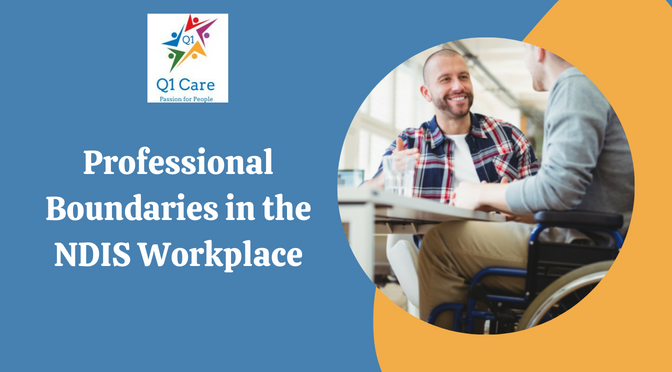“To provide high-quality service in the disability sector, NDIS workers are required to demonstrate professional boundaries”. Enjoy the opinion of Q1 Care.

Background
Boundaries in a therapeutic relationship are no boundaries that you can see like the yellow line on the highway telling you not to cross over the line in order to avoid danger. These boundaries are invisible but can be just as dangerous if crossed by most people. Having healthy boundaries in a therapeutic relationship comes naturally. It makes sense to most people that they should not have sexual relationships with their clients. They should not be friends on social media, and they should not be exchanging gifts yet for some workers. This is still an issue. Crossing boundaries is always inappropriate and can harm our clients who may be too vulnerable at the time to understand that they’re being taken advantage of.
A Therapeutic Relationship Explained
A therapeutic relationship is a close relationship between at least two people. In which one person, the helper is helping an individual, the client change his or her life for the better essential elements in this kind of relationship include the worker remaining supportive, no matter what the concerns of the client are. The worker also needs to avoid any judgements of the client and to treat the client with empathy, understanding and acceptance. These are all basic skills in the helping professions. Sometimes we forget that these skills must underlie every interaction that we have with our clients. We need to remember to treat our clients not as clients, but as people!
How to Maintain Boundaries

While offering services to your NDIS participants, there is a need for clear boundaries to protect the helping process and to keep the relationship professional, protect clients from being taken advantage of due to their vulnerability in the process, the clarity of boundaries assures that the helping interactions focus on the client and not on the helper. In some ways the client automatically trusts their helper as an authority figure. Although they may not trust the helper with all of their deep dark secrets right away, there’s a level of trust that the helper is not going to harm them. The helper should know this and should take extra steps to let clients know that we will not take advantage of that trust and confirm that we will do everything in a manner that is beneficial to them in changing their life in the way they want to change therapeutic boundaries, help our clients to feel safe. And finally clear boundaries are based on good decision-making skills, which helps the helper to make clear ethical decisions, which we will talk about later.
Healthy boundaries allow an NDIS participant to have high self-esteem be assertive and make good decisions, healthy boundaries, leave a person feeling good after the helping interaction. We all have that nagging feeling or instinct that tells us when something is not quite right. We need to listen to our instincts and follow clear guidelines to make absolutely sure no boundary violations are being made. Unhealthy boundaries occur when the attention to the helper role begins to break down just as the fence in the picture has begun to break down one way to avoid unhealthy boundaries. When working with a client is to ask ourselves the following questions. When working with the client, how would, what I am doing be viewed by my colleagues, family members of the clients, or my own family and friends? Am I giving this particular client special treatment that other clients are not receiving?
One important boundary to set in our work with others are the rules that we establish for how to contact us or someone else in various situations. First, we want to be clear to tell our NDIS clients what numbers to call in a crisis situation. It is important to provide all of our clients with a list of numbers to call otherwise. Our clients may try to contact us and only us numbers that we should make available to our clients include our office number. And after-hours answering service, other 24-hour call centres and the number for emergency services. Second, we want to refrain from giving out our personal contact information, telling clients to contact tact us at all hours and giving out our personal cell phone number, email, or address may lead to an unprofessional dynamic. It also may cause your client to lose faith in you.
Next demonstrating professional behaviour is an excellent way to keep professional boundaries clear. First, we want to establish clear physical boundaries. One of the most effective ways to establish clear boundaries is to let our behaviour set the standard for our meetings with our clients. It is important that we do not touch our clients in any, any inappropriate way. Inappropriate forms of touching might include hugging caressing or holding our clients’ hands. While you might think that these gestures show compassion or care, it is possible that they could make our clients feel uncomfortable. We want to ask ourselves if there is even the smallest possibility that our client could be harmed by our touching. If the answer to this question is yes, then we need to avoid making physical contact with our clients. Next, we want to make sure that we dress appropriately. Our style of dress will also signal professional boundaries.
Does Style of Dress Matter?

The style of dress should be appropriate for our setting, with the client and the activity that we have planned. We want to avoid any type of clothing that is revealing. This type of clothing could make our clients feel deeply uncomfortable and could set up an exploitative dynamic between us and the client. We also want to make sure that we use appropriate language. We should avoid using profanity. Even if our client often uses it, we should also avoid using any derogatory language such as insults or slurs. Even if our clients use this language, we want to make sure that our language is always appropriate so that our clients know that we are trustworthy and professional. And finally, as I’ve said before, we want to refrain from discussing our own personal life. We might feel the urge to discuss our personal problems or difficulty in order to relate to our clients, but our clients benefit more from our expertise than from our experiences. When we discuss intimate, personal details of our life with our clients, it could confuse our clients about the exact nature of our relationship and that can cause stress for our clients.
Non-Professional Life Matters!

And one final way to help maintain our professional boundaries is to nurture our own non- professional life. When our lives are full and satisfying, we are able to focus on service to our clients. When our personal lives become lacking in some aspect or unsatisfying, we may find ourselves in the non- professional position of getting some emotional or personal needs met by our clients. And this need can cause a violation of clear boundaries. The first way to nurture ourselves is to cultivate friendships outside of work. One of the best ways to maintain professional boundaries is to have a clear line between our professional life and our social life. Keep in touch with old friends from high school, college, or other work that you’ve done. If you are new to a city, try joining volunteer groups, community groups, or community sports organisations next participate in activities that you love.
If you enjoy reading, watching movies, taking photos, acting in a community theatre, singing in a local choir, then make these activities a robust part of your social life. Try to find a hobby that gives you regular weekly activities. It is not good enough to have something that you enjoy, that you get to do only every once in a while. I truly love playing tennis and badminton, but I only get to engage in those activities a couple of times per year. That’s not enough. I had to find activities that create enjoyment that I could do every day. Having something regularly scheduled outside of work will help you maintain professional boundaries while also reducing stress in your daily life. Next, leave work at the office, and establish clear boundaries for yourself, away from the office. Do not check your work, email voicemail, or take business calls. When you are at home or on vacation, you can still be an excellent case manager without working 24 hours a day. The field calls this principal work-life balance while certainly some of our needs are met by the work that we do. We want to assure that we fulfil the majority of our needs outside of work, family, friends, activities, and hobbies, which all lead to a full life.
Make Sure There Are No Boundary Violations
To make sure there are no boundary violations, ask the following questions:
Am I comfortable writing about this interaction in the progress notes in full detail?
Is what I am doing for the benefit of a client or for my own benefit?
One of the significant boundary violations is self-disclosure when it is given too much from the helper to the client. Clients do not need to know everything about us in order to have a good therapeutic relationship. Information given to the client should be to help the client in their process of healing. Inappropriate self-disclosure is when we share information about ourselves that does not benefit the helping process. A final rule to discuss when in doubt don’t do it. If there is ever any question about whether or not to do something with a client, wait until you have a clear answer before proceeding, ask for help from other professionals, get feedback from your supervisor or check the legal ramifications of your behaviour. The key is to think first double check the right response, and then act! The client’s health and well-being are far too important – as a helper, make sure that boundaries are set in the beginning of the therapeutic relationship. So, there is no confusion at any point in the process.
Please Note!
Q1 Care is dedicated to the provision of professional services that meet the needs of our many clients. Setting professional boundaries will ensure high-quality and uninterrupted services!
NEXT, WE SHALL DISCUSS PROFESSIONAL ETHICS, THANK YOU FOR READING.



